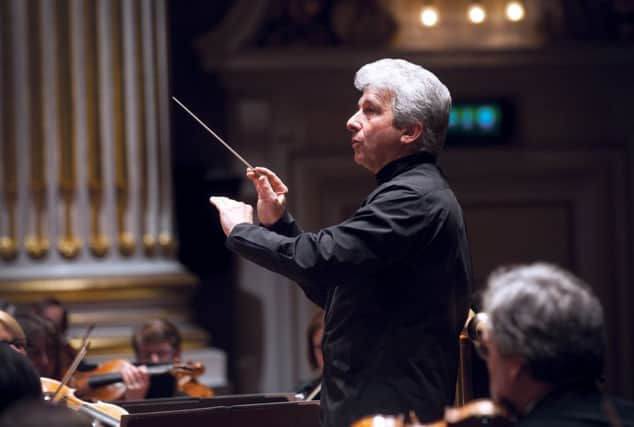High and low notes for classical music in 2013


It was inevitable that a plentiful supply of Benjamin Britten’s music would be woven through a year dedicated to worldwide celebrations of the centenary of his birth. Such golden extravagances as the Royal Scottish National Orchestra’s performance under music director Peter Oundjian of the awesome War Requiem, or the BBC Scottish Symphony Orchestra’s trenchant account under Donald Runnicles of the rarely performed Sinfonia da Requiem, or the gentle charm of the Serenade for tenor, horn and strings sublimely delivered by the Scottish Chamber Orchestra with its own superlative principal horn Alec Frank-Gemmill in the spotlight, are just a snapshot of the many fine Britten tributes that came our way.
But there was plenty room left for other celebrations, themes and highlights to emerge. It was something of a shock, for instance, to learn that the SCO was coming up 40 years of age, and that the current season would mark that milestone. And how thrilling to see just a few weeks ago Sir Peter Maxwell Davies, long standing associate of the SCO, bound onto the stage to acknowledge the world premiere of his birthday tribute to the orchestra, the exuberant tone poem Ebb of Winter, inspired by the mercurial weather around his home in Orkney.
Advertisement
Hide AdIt was a truly touching moment for the near 80-year-old Master of the Queen’s Music; and a musically significant one. For not only did he seem fighting fit after a year of battling cancer, but the music revealed a softened side to the composer – glittering sounds that danced with new-found energy, lyrical buoyancy and ease of spirit, as well as promise (by him) of more to come.
While the orchestral seasons were consistently strong, the world of opera was knocked sideways when, in September, Scottish Opera’s newly appointed music director Emmanuel Joel-Hornak walked out after only 58 days in the job. Even now opera boss Alex Reedijk has refused to say why that happened.
The Frenchman’s departure coincided with growing criticism that Scottish Opera was selling the opera-going public short in relation to the quantity and quality of its main-scale output.
Its summer presence at the Edinburgh International Festival – in An American Lulu, a horrifyingly misguided rewrite of Berg’s Lulu – was cringeworthy, leading many to question the artistic competence of the company’s planning team. This story will run.
Festival-wise, it was a bumper year, not just with those already established, but with the promise of one very exciting new initiative on the horizon.
The centrepiece as always – Edinburgh International Festival – was Jonathan Mills’ penultimate as EIF director, and musically he pulled a corker out of the bag. I’ve never issued so many five-star reviews, and many of these performances are still echoing in my mind.
Advertisement
Hide AdOn the orchestral front, Mariss Jansons’ Mahler 2 with the Bavarian Radio Symphony Orchestra was monumental; the RSNO’s performance of Prokofiev’s Alexander Nevsky was a resounding Festival opener; and Donald Runnicles and the BBC SSO’s Verdi Requiem a blistering finale. Common to all was the Edinburgh Festival Chorus, now wholesome, fiery, confident, and singing at its absolute peak under the directorship of Christopher Bell.
Elsewhere in the EIF, the Queen’s Hall series was equally strong – some exceptional pianists from Nikolai Lugansky to Pierre-Laurent Aimard, and sublime violinist Midori – though, once again, opera was a mixed bag, from Lyon Opera’s lost-in-space Fidelio to a hair-raising, quirky take by Frankfurt Opera on Purcell’s Dido and Aeneas. What is it with opera in Scotland at the moment?
Advertisement
Hide AdOrkney’s St Magnus Festival spotlighted one of Scotland’s leading contemporary music groups, the Hebrides Ensemble, in another new work by Maxwell Davies – the Oboe Quartet – in an ambitious series of programmes. There was high-voltage music-making, too, at the East Neuk Festival, where an outdoor percussion extravaganza in the grounds of Cambo House glistened in the summer heatwave. A dizzyingly full programme at East Lothian’s Lammermuir Festival was one of its best ever.
With these over by late autumn, all eyes turned to the Ayrshire town of Cumnock, where its best-known musical son, composer James MacMillan, accompanied by fellow Ayrshire-born Nicola Benedetti, announced a new festival – the Cumnock Tryst – which will be inaugurated next October.
The significance of this was not lost on the massive press and arts industry turnout, key figures from London included. For implicit within MacMillan’s spoken vision of the event was the promise that his involvement will be central and effectively a lifelong commitment. He will write music for successive festivals, and will draw, no doubt, international performers of the highest calibre. There were clear echoes of the beginnings of St Magnus, and Maxwell Davies’ vision for that festival in the 1970s, in what MacMillan is proposing for his own home town.
One final observation of the year. Why are we witnessing such a glut of piano music from the best soloists around? Perth Concert Hall’s new Sunday afternoon series – which opened triumphantly with native pianist Steven Osborne - is evolving into something not to be missed, as is Glasgow Concert Hall’s own piano series. Keep them coming.